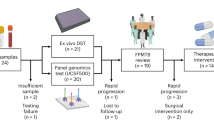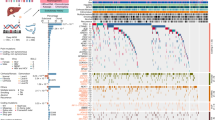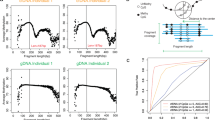Abstract
The management of secondary findings (SFs), which are beyond the intended purpose of the analysis, from clinical comprehensive genomic analysis using next generation sequencing (NGS) presents challenges. Policy statements regarding their clinical management have been announced in Japan and other countries. In Japan, however, the current status of and attitudes of clinical genetics professionals toward reporting them are unclear. We conducted a questionnaire survey of clinical genetics professionals at two time points (2013 and 2019) to determine the enforcement of the SF management policy in cases of comprehensive genetic analysis of intractable diseases and clinical cancer genome profiling testing. According to the survey findings, 40% and 70% of the respondents stated in the 2013 and 2019 surveys, respectively, that they had an SF policy in the field of intractable diseases, indicating that SF policy awareness in Japan has changed significantly in recent years. Furthermore, a total of 80% of respondents stated that their facility had established a policy for clinical cancer genome profiling testing in the 2019 survey. In both surveys, the policies included the selection criteria for genes to be disclosed and the procedure to return SFs, followed by recommendations and proposals regarding SFs in Japan and other countries. To create a better list of the genes to be disclosed, further examination is needed considering the characteristics of each analysis.
This is a preview of subscription content, access via your institution
Access options
Subscribe to this journal
Receive 12 print issues and online access
$259.00 per year
only $21.58 per issue
Buy this article
- Purchase on Springer Link
- Instant access to full article PDF
Prices may be subject to local taxes which are calculated during checkout




Similar content being viewed by others
References
Green RC, Berg JS, Grody WW, Kalia SS, Korf BR, Martin CL, et al. American College of Medical Genetics and Genomics. ACMG recommendations for reporting of incidental findings in clinical exome and genome sequencing. Genet Med. 2013;15:565–74.
ACMG Board of Directors. ACMG policy statement: updated recommendations regarding analysis and reporting of secondary findings in clinical genome-scale sequencing. Genet Med. 2015;17:68–9.
Wolf SM, Annas GJ, Elias S. Point-counterpoint. Patient autonomy and incidental findings in clinical genomics. Science. 2013;340:1049–50.
McGuire AL, Joffe S, Koenig BA, Biesecker BB, McCullough LB, Blumenthal-Barby JS, et al. Point-counterpoint. Ethics and genomic incidental findings. Science 2013;340:1047–8.
Ministry of Education, Culture, Sports, Science and Technology, Ministry of Health, Labour and Welfare, and Ministry of Economy, Trade and Industry. Ethical Guidelines for Human Genome/Gene Analysis Research, Full Revision on 08 February 2013. https://www.mhlw.go.jp/seisakunitsuite/bunya/hokabunya/kenkyujigyou/i-kenkyu/dl/130208sisin.pdf Accessed 05 May 2020.
Kalia SS, Adelman K, Bale SJ, Chung WK, Eng C, Evans JP, et al. Recommendations for reporting of secondary findings in clinical exome and genome sequencing, 2016 update (ACMG SF v2.0): a policy statement of the American College of Medical Genetics and Genomics. Genet Med. 2017;19:249–55.
Japan Society of Human Genetics. Statement regarding the comprehensive genomic analysis using Next Generation Sequencer. https://jshg.jp/wp-content/uploads/2017/11/237481cfae4fcef8280c77d95b574a97.pdf Accessed 05 May 2020.
Japan Agency for Medical Research and Development. Proposal concerning the information transmission process in genomic medicine. Part 2: Specific principles of comprehensive germline genetic analysis using next-generation sequencing [Revised edition], Revised on 12 December 2019. http://sph.med.kyoto-u.ac.jp/gccrc/pdf/a10_Part2.pdf Accessed 27 June 2020.
Japan Agency for Medical Research and Development. Proposal concerning the information transmission process in genomic medicine. Part 1: Focusing on comprehensive tumor genomic profiling analysis [Revised 2nd edition], Revised on 11 December 2019. http://sph.med.kyoto-u.ac.jp/gccrc/pdf/a10_Part1.pdf Accessed 27 June 2020.
Ministry of Health, Labour and Welfare, Central Social Insurance Medical Council. https://www.mhlw.go.jp/content/12404000/000513115.pdf Accessed 05 May 2020.
Lohn Z, Adam S, Birch P, Townsend A, Friedman J. Genetics professionals’ perspectives on reporting incidental findings from clinical genome-wide sequencing. Am J Med Genet A. 2013;161A:542–9.
Lemke AA, Bick D, Dimmock D, Simpson P, Veith R. Perspectives of clinical genetics professionals toward genome sequencing and incidental findings: a survey study. Clin Genet. 2013;84:230–6.
Fernandez CV, Strahlendorf C, Avard D, Knoppers BM, O’Connell C, Bouffet E, et al. Attitudes of Canadian researchers toward the return to participants of incidental and targeted genomic findings obtained in a pediatric research setting. Genet Med. 2013;15:558–64.
Mackley MP, Fletcher B, Parker M, Watkins H, Ormondroyd E. Stakeholder views on secondary findings in whole-genome and whole-exome sequencing: a systematic review of quantitative and qualitative studies. Genet Med. 2017;19:283–93.
van El CG, Cornel MC, Borry P, Hastings RJ, Fellmann F, Hodgson SV, et al. Whole-genome sequencing in health care. Recommendations of the European Society of Human Genetics. Eur J Hum Genet 2013;21 Suppl 1 Suppl 1:S1–S5.
The Law to Amend the Medical Care Law, revised in 2018. https://elaws.e-gov.go.jp/search/elawsSearch/elaws_search/lsg0500/detail?lawId=429AC0000000057&openerCode=1 Accessed 05 May 2020.
Desnick RJ, Schuchman EH. Enzyme replacement therapy for lysosomal diseases: lessons from 20 years of experience and remaining challenges. Annu Rev Genomics Hum Genet. 2012;13:307–35.
Parenti G, Andria G, Valenzano KJ. Pharmacological chaperone therapy: preclinical development, clinical translation, and prospects for the treatment of lysosomal storage disorders. Mol Ther 2015;23:1138–48.
Rao VK, Kapp D, Schroth M. Gene therapy for spinal muscular atrophy: an emerging treatment option for a devastating disease. J Manag Care Spec Pharm 2018;24 12-a Suppl:S3–16.
Bennett CF, Krainer AR, Cleveland DW. Antisense oligonucleotide therapies for neurodegenerative diseases. Annu Rev Neurosci 2019;42:385–406.
Dong Y, Siegwart DJ, Anderson DG. Strategies, design, and chemistry in siRNA delivery systems. Adv Drug Deliv Rev 2019;144:133–47.
Ebi H, Bando H. Precision oncology and the universal health coverage system in Japan. JCO Precision. Oncology 2019;3:1–12.
Ministry of Health, Labour and Welfare. Table of core hospitals for cancer genome medicine in the cancer genome medicine provision system. https://www.mhlw.go.jp/content/000597778.pdf Accessed 05 May 2020.
Japan Agency for Medical Research and Development. Potentially Actionable SF Gene List. https://www.amed.go.jp/content/000056448.pdf Accessed 05 May 2020.
Acknowledgements
We would like to thank all those who have assisted in the questionnaire survey and received the guidance and support of clinical geneticists and certified genetic counselors. We would like to thank Editage (www.editage.com) for English language editing. This study was supported by Japan Agency for Medical Research and Development, AMED, under Grant Number 17kk0305006h0001.
Author information
Authors and Affiliations
Corresponding author
Ethics declarations
Conflict of interest
The authors declare that they have no conflict of interest.
Additional information
Publisher’s note Springer Nature remains neutral with regard to jurisdictional claims in published maps and institutional affiliations.
Rights and permissions
About this article
Cite this article
Tsuchiya, M., Yamada, T., Akaishi, R. et al. Attitudes toward and current status of disclosure of secondary findings from next-generation sequencing: a nation-wide survey of clinical genetics professionals in Japan. J Hum Genet 65, 1045–1053 (2020). https://doi.org/10.1038/s10038-020-0802-2
Received:
Revised:
Accepted:
Published:
Issue Date:
DOI: https://doi.org/10.1038/s10038-020-0802-2
This article is cited by
-
Challenges of secondary finding disclosure in genomic medicine in rare diseases: A nation-wide survey of Japanese facilities outsourcing comprehensive genetic testing
Journal of Human Genetics (2023)
-
The return of individual genomic results to research participants: design and pilot study of Tohoku Medical Megabank Project
Journal of Human Genetics (2022)



